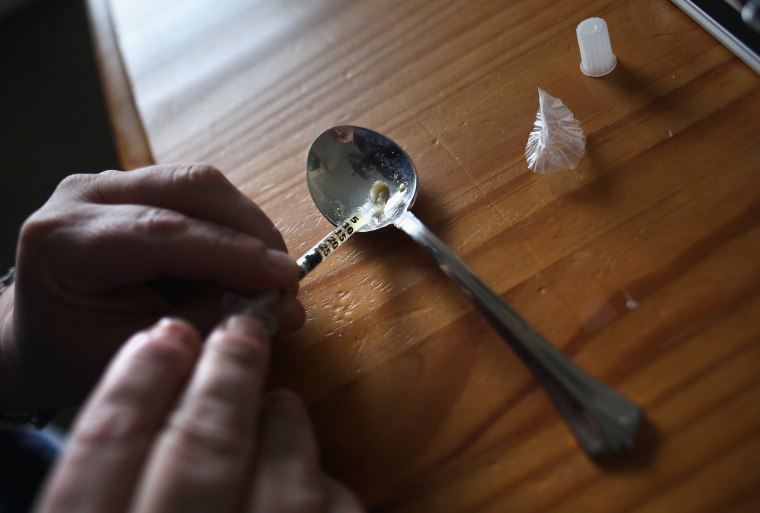A viral video from a Florida sheriff flanked by four masked officers in tactical gear while warning that he will "come after" heroin dealers is a misguided way to address the opioid epidemic, say drug policy experts.
Lake County Sheriff Peyton Grinnell put out the ominous clip on Friday, warning drug dealers who happened to be viewing his agency's Facebook page that he’s "coming for" them.
"Enjoy trying to sleep tonight, wondering if tonight's the night our SWAT team blows your front door off the hinges," he says to the underlay of battle-ready music.
"If our agents can show the nexus between you the pusher of poison and the person that overdoses and dies, we will charge you with murder," he says at the end of the video. "We are coming for you. Run."
Some experts found it to be attention grabbing, which is the ultimate goal to promote awareness for any issue they said, but others found it at odds with more effective methods of combating the drug crisis.
"I liked it," said Sheriff Michael D. McCoy who sits on the Mayor's Community Coalition Against Heroin in Peoria County, Illinois. “I think it’s one of several good approaches to this issue,” he said.
“It definitely gets the point across,” said Lt. Tom Fallon, Investigative Commander of the Hamilton County Heroin Drug Task Force in Ohio. “I think that’s almost the message any community facing a heroin problem is trying to send."
Related: Chronic Pain Sufferers Are Scared by Ohio’s New Opioid Rules
But Fallon did note he’s not sure the approach is “necessarily” something his jurisdiction would take — a sentiment shared by other law enforcement.
“The video could be effective if they really do have addresses, search warrants, and the other information they are saying,” said Sheriff Chris Donelan, who sits on the Opioid Task Force of Franklin County and the North Quabbin Region of Massachusetts.
“But that’s a lot of ifs,” he said, adding that his jurisdiction uses a more community-based approach to the treatment and intervention.
In an interview with the Orlando Sentinel Monday, Grinnell said "I'm just doing what I’m elected to do."
The Lake County Sheriff’s Office did not return requests for comment by NBC News.
Lake County, which has a population of just over 335,000, went from zero heroin-related fatalities in 2015 to six in 2016, according to the Fifth Circuit Medical Examiner’s Office that tracks the county’s data.
While the Sunshine State had a 73 percent increase in heroin deaths between 2014 and 2015, Lake County falls on the lower end, coming in at less than 5 heroin deaths per 100,000, according to the Florida Department of Law Enforcement.

While the video was seen as a unique approach to battling an epidemic that has swallowed several segments of the American population — sparking countless state and federal responses — many felt the video totally missed the mark.
“These kinds of brutal tactics never work to lessen drug trafficking,” said Vanda Felbab-Brown, the director of the Improving Global Drug Policy Project at the Brookings Institute.
Most users are dealers to support their habits, and most are not violent, she said. “Throwing dealers and users in jails doesn’t lessen drug abuse. On the contrary, scare tactics makes them “retreat into the shadows” instead of seeking help, she said.
Harm reduction policies have proven to be much more effective, she said. “This includes safe injection sites, providing new needles, and encouraging users to get tested,” she said.
“There are a multitude of studies that show that stiffer penalties for using or dealing drugs does not result in a decrease in the behavior,” said Khary Rigg, a professor at Department of Mental Health Law & Policy at the University of South Florida. “We have over three decades of data that show us that law enforcement crackdowns on street dealers and users should not be the primary strategy for addressing illicit drug use in our country."
Related: For Governor Christie, the Battle Against Opioid Addiction Is Personal
Deaths from opioid drug overdoses have hit an all-time record in the U.S., rising 14 percent in just one year in 2014, and heroin deaths quadrupled between 2002 and 2013. During his last year in office, Former President Barack Obama asked for $1 billion to fight the opioid epidemic and signed the Comprehensive Addiction Recovery Act to expand prevention efforts, training programs, and treatment access.
The Lake County approach “flies in the face” of how far many drug enforcement agencies have come with effective drug policy, said Ezekiel Edwards, director of the Criminal Law Reform Project the American Civil Liberties Union.
The most effective way to deal with opioid use is a more “humane, community-based” public-health program that looks at preventative measures, he said. "It's proven."